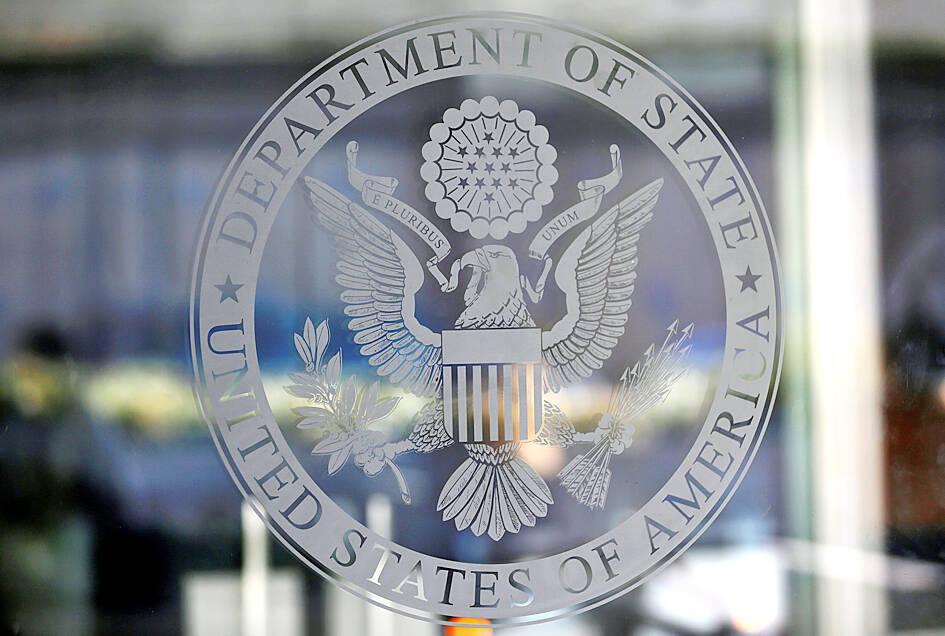The US Department of State yesterday said that any stopovers by President William Lai (賴清德) would be "in line with past practice, and fully consistent with our longstanding policy."
In an e-mailed response to CNA's inquiry regarding US policies on Taiwanese presidential transits and their consideration of relations with Beijing, the department said that stopovers by high-level Taiwan officials are "undertaken with consideration for the safety, comfort, convenience and dignity of the passenger."

Photo: Reuters
On Friday, US Secretary of State Marco Rubio told reporters after he met with Chinese Minister of Foreign Affairs Wang Yi (王毅) in Malaysia that Wang had not warned him against "welcoming" Lai.
Taiwanese local media, citing an unnamed source, reported today that Lai plans to make stopovers in New York and Dallas, Texas, during state visits next month to Taiwan's allies in Central and South America, including Paraguay, Guatemala and Belize.
In response to the report, the Taipei Economic and Cultural Representative Office in the US said there was nothing to announce at the moment, but that the Presidential Office would release any arrangements as required.
Presidential Office spokesperson Karen Kuo (郭雅慧) echoed the statement, saying the office would inform the public in due course about any relevant arrangements if they are confirmed.
Lai made US stopovers in Hawaii and Guam during a trip to the South Pacific late last year.
Next month's stopovers would be his first in the continental US since taking office, if they materialize.

Eight restaurants in Taiwan yesterday secured a one-star rating from the Michelin Guide Taiwan for the first time, while three one-star restaurants from last year’s edition were promoted to two stars. Forty-three restaurants were awarded one star this year, including 34 in Taipei, five in Taichung and four in Kaohsiung. Hosu (好嶼), Chuan Ya (川雅), Sushi Kajin (鮨嘉仁), aMaze (心宴), La Vie by Thomas Buhner, Yuan Yi (元一) and Frassi in Taipei and Front House (方蒔) in Kaohsiung received a one-star rating for the first time. Hosu is known for innovative Taiwanese dishes, while Chuan Ya serves Sichuan cuisine and aMaze specializes

STATS: Taiwan’s average life expectancy of 80.77 years was lower than that of Japan, Singapore and South Korea, but higher than in China, Malaysia and Indonesia Taiwan’s average life expectancy last year increased to 80.77 years, but was still not back to its pre-COVID-19 pandemic peak of 81.32 years in 2020, the Ministry of the Interior said yesterday. The average life expectancy last year increased the 0.54 years from 2023, the ministry said in a statement. For men and women, the average life expectancy last year was 77.42 years and 84.30 years respectively, up 0.48 years and 0.56 years from the previous year. Taiwan’s average life expectancy peaked at 81.32 years in 2020, as the nation was relatively unaffected by the pandemic that year. The metric

Taitung County is to launch charter flights to Malaysia at the end of this year, after setting up flights to Vietnam and Thailand, the Taitung County Government said yesterday. The new charter flight services, provided by low-cost carrier Batik Air Malaysia, would be part of five-day tour packages for visits to Taitung County or Malaysia. The Batik Air charter flight, with about 200 seats, would take Malaysian tourists to Taitung on Dec. 30 and then at 12:35pm return to Kuala Lumpur with Taiwanese tourists. Another charter flight would bring the Taiwanese home on Jan. 3 next year, arriving at 5:30pm, before taking the

Taiwan High Speed Rail Corp. (THSRC) plans to ease strained capacity during peak hours by introducing new fare rules restricting passengers traveling without reserved seats in 2026, company Chairman Shih Che (史哲) said Wednesday. THSRC needs to tackle its capacity issue because there have been several occasions where passengers holding tickets with reserved seats did not make it onto their train in stations packed with individuals traveling without a reserved seat, Shih told reporters in a joint interview in Taipei. Non-reserved seats allow travelers maximum flexibility, but it has led to issues relating to quality of service and safety concerns, especially during